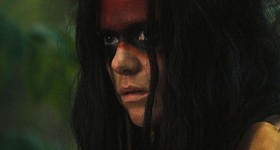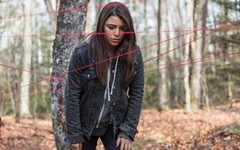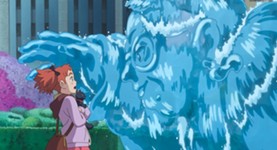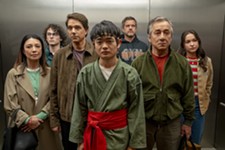DVD Watch: My Neighbor Totoro
Hayao Miyazaki's sweet and monstrous classic arrives on Blu-ray
By Richard Whittaker, 11:00AM, Tue. May 21, 2013
When Japanese animation icon Hayao Miyazaki moved in next door to My Neighbor Totoro, it was almost a disaster. Instead, 25 years later, the tale of two Japanese girls and their magical troll friend has earned a Blu-ray release as a landmark cartoon feature.
On the surface is the story of two girls and their father, who move to a small village a couple of hours outside of Tokyo, while their mother is in hospital. But there's more than just rice paddies and camphor trees in this green idyll. There are also Totoros, a strange, fuzzy, friendly kind of beast that somehow is there just when they are needed.
It's odd to think that, before it shifted a million cuddly toys, My Neighbor Totoro was kind of a box office bomb when it was released in 1998. Back then, a U.S. archival release would seem near-impossible. Now it's far less of a gamble. Back in 1993, Miyazaki was not a brand name in the States, and only hardcore anime fans (as if there were any other kind back then) knew about Studio Ghibli. That could explain why the original cinematic release was left to Troma (yup, home of The Toxic Avenger). It has re-emerged over time, including a 2002 DVD from Fox, but this is the 2005 version, redubbed by Disney and available for the first time on Blu-ray.
There are some nice touches on the Disney dub, like having Dakota Fanning and her sister Elle provide the voices of 10-year-old Satsuki and her little sister, Mei, the protagonists of the story. Of course, there are fervent fans of the "Troma dub," and then there are "subtitles or nothing" purists. Frankly, I'm glad we're just out of the era when cut-price import houses would make up a clumsy translation in an afternoon. Yes, there's always the concern that Disney seems to be hoovering up all the intellectual property rights for everyone's childhood, but at least they're treating it with a degree of respect.
The rest of the disc is basically the 2010 DVD release, scrubbed up for hi-def TV. Most of the extras are made up of interviews with Miyazaki and his long-time producer Toshio Suzuki, with a particularly insightful introduction to the director's lifelong working relationship with composer Joe Hisaishi.
It also put the importance of Totoro into perspective. Miyazaki had been a jobbing animator when he broke out as a director. His cinematic debut, Lupin III: The Castle of Cagliostro, was a jolly enough crime romp for kids, but it was with the magical double-whammy of prescient eco-fantasy Nausicaä of the Valley of the Wind (1984) and, for my money, his finest work and his first formal release from Studio Ghibli, 1986's Castle in the Sky, that he really broke out. But as he explains in one of the featurettes accompanying this re-release, he was dissatisfied with making films in a fantasy environment. He wanted something more familiar, set in the idyllic rural Japan of his childhood. Unfortunately for him, his ode to childhood came out the same year that Toho turned the animation world to rubble under the psychic blast of Akira, and Totoro sank without trace. Two and a half decades later, it is now an established and beloved part of the animation canon. It's also arguably still Miyazaki's most personal work.
Totoro is kind of an oddity, in many ways as Western as it is Nipponese. Miyazaki has always been obsessed with Western literature (Howl's Moving Castle, his adaptation of the novel by Diana Wynne Jones, is also released on Blu-ray this week). Similarly Castle in the Sky is drenched in Jules Verne and Jonathan Swift, and that continues here. Totoro is most heavily reminiscent of classic British children's books like Five Children and It, where kids on vacation have their world turned pleasantly upside-down by a strange, potentially mythical beastie. There's no question of what it is or why it's there. It just sort of … is. And through the eyes of child, where everything is magical and fresh and new, it's no odder or less wondrous than a leaf or a bridge or a cloud. At the same time, adults can never see these wonders, even if they can feel their effects.
Miyazaki also catches up on that underlying sense of bleakness that is so common in British kids' books. There's always a little back story about why the kids are displaced, or why their parents are so disengaged and absent. The sub-plot about Mei and Satsuki's mother plays a little darker if you realize that the film was originally screened in a double bill with the bleaker Grave of the Fireflies. Rather than being in hospital for a cold, she's recovering from tuberculosis. That's something drawn from the director's own childhood, but he never makes it explicit: After all, he was still trying to make a fantasy accessible to small children.
Totoro is driven by the same pastoral yearnings and environmental concerns that powered both Nausica and Castle. In some ways, its narrative was also a reaction against their dire warnings and apocalyptic sensibilities, and he doesn't really resurrect their harder-hitting fantastical style until 1997's Princess Mononoke. Rather than play the role of a Luddite Cassandra over humanity's fascination with technology and rejection of nature, Miyazaki and his animators simply recreate the lush forests, dreaming stream and rolling hills of the Kanto plain where he spent much of his childhood. Actually, possibly the most rewarding extra on this disc is The Locations of Totoro. It's basically half an hour of actress Mayu Tsuruta wandering through the Sayama hills with a set of story boards under her arm, hunting for the locations that inspired him.
And the inspiration is everywhere. Miyazaki catches Japan in that transition between the Meiji restoration and the democratization of the postwar, post-occupation era. He loads the film with tiny details of the region and the era, like the Shimenawa, or rice straw ropes, looped around around trees thought to house spirits. Or the way the girls have to prime the water pump before they can have a bath with their father (for all his Western influences, Miyazaki has the traditional Japanese ease with family nudity). The film may have tanked on original release, but it helped reinvigorate Japan's connection to its rural past just as it was becoming a technological mecca. As Tsuruta finds, there are now Totoro forests, areas of Japan being protected by a charitable trust to protect the countryside behind the images. Beyond his tale of strange and wonderful beasts, that may be Miyazaki's greatest legacy.
My Neighbor Totoro is available in a Blu-ray/DVD combo pack this week. Also out this week:
The ABCs of Death (Magnet): The Drafthouse-spawned horror anthology/linguistic primer (see our review here)
Medium Cool (Criterion): Haskel Wexler wanted a semi-improv'd drama against a background of social fury. He got a lot more than he bargained on for when his cast ran straight into the riots at the 1968 Democratic National Convention. A true landmark in cinema verite (Read Louis Black's 2005 examination of Wexler's work.)
Side Effects (Open Road): Steven Soderbergh continues his growth as a crafter of elegant thrillers and wait, what, he's given up to become a painter? (See our review here.)
Parker (FilmDistrict): Jason Statham hitting things in an adaptation of a Richard Stark novel. Is it as good as the graphic novel by Darwyn Cooke? (See our review here.)
The Rolling Stones: Crossfire Hurricane (Eagle Rock Entertainment): Brett Morhen's definitive documentary on the early years of the pioneers of stadium-sized sleaze, complete with vintage footage from 1964-5.
A note to readers: Bold and uncensored, The Austin Chronicle has been Austin’s independent news source for over 40 years, expressing the community’s political and environmental concerns and supporting its active cultural scene. Now more than ever, we need your support to continue supplying Austin with independent, free press. If real news is important to you, please consider making a donation of $5, $10 or whatever you can afford, to help keep our journalism on stands.
Richard Whittaker, April 19, 2018
Richard Whittaker, April 3, 2018
Richard Whittaker, Sept. 30, 2017
May 31, 2025
DVD Watch, Studio Ghibli, Hayao Miyazaki, My Neighbor Totoro, Lupin III, Grave of the Fireflies, Nausicaä of the Valley of the Wind, Castle in the Sky, Howl's Moving Castle












